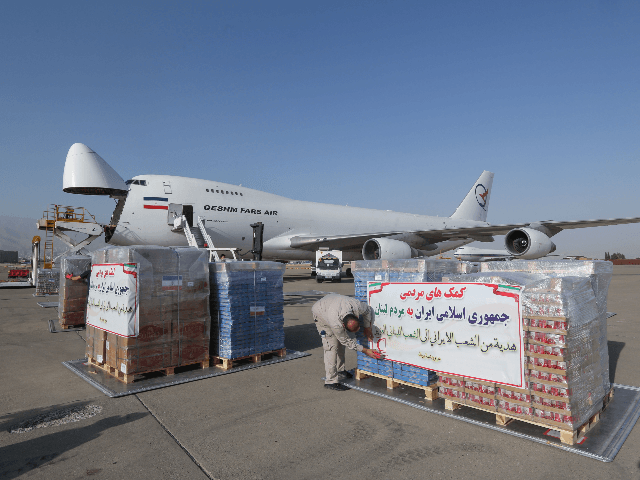The government of Iran and leaders of Hezbollah, Iran’s terrorist proxy group in Lebanon, offered assistance to the city of Beirut after a massive explosion on Tuesday caused enormous damage and casualties.
Hezbollah issued a statement on Tuesday offering “deepest condolences over the national tragedy which took place in Lebanon in these hard times,” a reference to the economic and political crises that were gripping the nation even before the explosion.
“This grievous disaster, along with its unprecedented repercussions and damage it had caused on several levels, requires a national stand by all Lebanese people and powers in a bid to overcome this ordeal,” the Hezbollah statement said.
The extremist group saluted the efforts of first responders in Beirut and said it would put “all capabilities” at the disposal of “honored people and dear citizens.” It also postponed a speech by its leader, Hassan Nasrallah, that had been scheduled for Wednesday to honor three days of national mourning declared by the government.
Hezbollah’s patrons in Tehran also offered their support. Iranian President Hassan Rouhani pledged “medical and pharmaceutical aids” on Wednesday in a message to Lebanese President Michel Aoun.
“Our thoughts and prayers are with the great and resilient people of Lebanon. As always, Iran is fully prepared to render assistance in any way necessary. Stay strong, Lebanon,” Iranian Foreign Minister Mohammad Javad Zarif said on Twitter.
The amount of aid Iran could provide is open to question. Iran was hit hard by the Wuhan coronavirus, its government complains constantly of poverty due to U.S. sanctions, and the Iranian people complain constantly about their government squandering public money on foreign adventures, including support for Hezbollah in Lebanon. The Iranian military would have trouble shipping humanitarian aid through its primary naval port of Bandar Abbas at the moment because it managed to block access to the port by sinking a scaled-down wooden replica of an American aircraft carrier in shallow water during a war game last week.
Iran and Hezbollah have good reasons to be nervous about the situation in Lebanon. Writing at the Spectator on Tuesday, Paul Wood cited Lebanese contacts who said the battle to spin the explosion for political advantage began while debris was still raining from the sky:
Who decided to leave this huge amount of bomb making material near the centre of Beirut? Several Lebanese friends and contacts messaged to say that this could only be Hezbollah, the Shiite militia and shadow state in Lebanon. Even if that’s not true, it shows what some Lebanese are thinking — and therefore how this crisis might develop. Hezbollah, through its media outlets, spoke about an accident involving ‘fireworks’. Major General Abbas Ibrahim, head of Lebanon’s General Security Directorate, said, acidly, that it would be ‘naive to describe such an explosion as due to fireworks’.
Someone I know with good contacts in the Hezbollah leadership said there had been an Israeli drone strike on a Hezbollah weapons dump. Perhaps that will be Hezbollah’s new line to take. Several witnesses have said they heard a plane flying low overhead before the explosion. A retired Army general, interviewed on Lebanese television, said he even saw a plane and that it fired a missile. Israel has denied having anything to do what happened and has offered to send aid. Lebanon and Israel remain in a formal state of war – there’s no chance whatsoever that aid would be accepted.
“If Hezbollah are in any way to blame for this, it will be very bad for Lebanon – even if the explosion was an accident,” Wood predicted, alluding to Hezbollah members serving as Lebanese officials who might have played some role in leaving a huge quantity of explosive material in a warehouse with minimal safety protocols.
The Jerusalem Post recalled on Wednesday that Hezbollah was caught stockpiling ammonium nitrate, the fertilizer chemical blamed for the Beirut explosion, in the U.K. and Germany over the past few years. The explosive was much more carefully stored in ice packs than the huge and apparently unsecured quantity of ammonium nitrate said to be kept at the Port of Beirut.
Israel’s intelligence service, the Mossad, helped the Germans find Hezbollah’s ammonium nitrate stash last year, while the British police and intelligence officers who found the London stockpile in 2015 believed it was intended for use in terrorist attacks.
The U.K. formally banned both the political and paramilitary wings of Hezbollah in 2019, while Germany effectively outlawed the group in 2020. The United States designated Hezbollah as a foreign terrorist organization in 1997 and has been pressing the entire European Union to ban the organization.

COMMENTS
Please let us know if you're having issues with commenting.